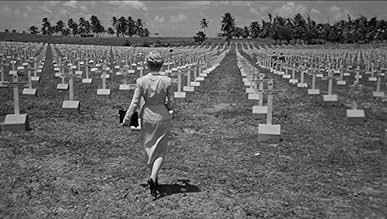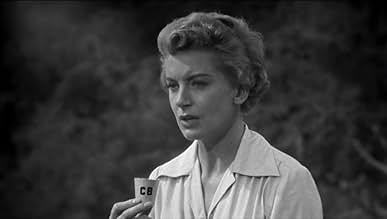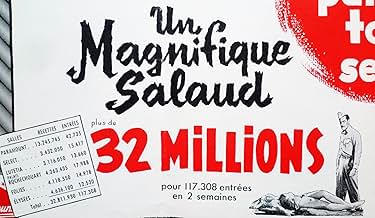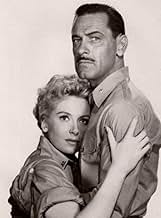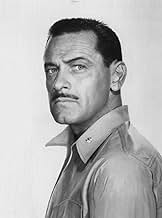En el Pacífico durante la Segunda Guerra Mundial, una viuda católica romana se enamora de un tenaz teniente coronel.En el Pacífico durante la Segunda Guerra Mundial, una viuda católica romana se enamora de un tenaz teniente coronel.En el Pacífico durante la Segunda Guerra Mundial, una viuda católica romana se enamora de un tenaz teniente coronel.
- Dirección
- Guionistas
- Elenco
- Nominado a 2 premios Óscar
- 2 nominaciones en total
Claude Akins
- Big Soldier
- (sin créditos)
Nina Borget
- French Woman
- (sin créditos)
George Brenlin
- Casualty
- (sin créditos)
Lorayne Brox
- Sissie
- (sin créditos)
Evelyn Cotton
- Beth
- (sin créditos)
Maynard Ferguson
- Trumpet Player in Dance Scene
- (sin créditos)
- Dirección
- Guionistas
- Todo el elenco y el equipo
- Producción, taquilla y más en IMDbPro
Opiniones destacadas
Deborah Kerr is a war widow during the Second World War. Her husband joined the Marines, despite being an architect and thus made for the Engineers, became a paratrooper, and died on Guadalcanal. So she has joined the American Red Cross and is working under Thelma Ritter. Tough-as-nails William Holden sees her, decides he wants her, and they begin an affair preparatory to getting married. It doesn't work out well.
Somehow we are to think that these two manipulative characters matters a hill of beans, when the supporting characters have so little trouble stealing our attention whenever they're onscreen. Thelma Ritter, of course, but also Dewey Martin as a Marine whom Miss Ritter saved from prison by running a settlement house in his terrible neighborhood; Adam Williams, as the man who tells Miss Kerr off; even Michele Montau as a man-hungry widow.
George Seaton had been an auteur since before they coined the term, and this was the 1950s, so there's certainly some bloating here, with almost two hour elapsing from start to finish. He certainly offers the audience enough big shots, with Puerto Rico standing in for New Caledonia. Holden and Miss Kerr play their roles to the hilt, but I kept waiting for Frank Gorshin or Ross Bagdasarian to show up again.
Somehow we are to think that these two manipulative characters matters a hill of beans, when the supporting characters have so little trouble stealing our attention whenever they're onscreen. Thelma Ritter, of course, but also Dewey Martin as a Marine whom Miss Ritter saved from prison by running a settlement house in his terrible neighborhood; Adam Williams, as the man who tells Miss Kerr off; even Michele Montau as a man-hungry widow.
George Seaton had been an auteur since before they coined the term, and this was the 1950s, so there's certainly some bloating here, with almost two hour elapsing from start to finish. He certainly offers the audience enough big shots, with Puerto Rico standing in for New Caledonia. Holden and Miss Kerr play their roles to the hilt, but I kept waiting for Frank Gorshin or Ross Bagdasarian to show up again.
Considering the cast this oddly obscure WWII war drama is nothing special but is ultimately an entertaining drama.
The basic story is a standard one of a clash of values between two people with very different life experiences.
The best performance as usual comes from Thelma Ritter as a no nonsense nurse, whenever she's on screen she cuts right through the somewhat sugary dramatics with astringent fortitude.
Deborah Kerr and William Holden perform their assigned roles well but their characters are both pretty selfish and unsympathetic to involve you in their story.
The basic story is a standard one of a clash of values between two people with very different life experiences.
The best performance as usual comes from Thelma Ritter as a no nonsense nurse, whenever she's on screen she cuts right through the somewhat sugary dramatics with astringent fortitude.
Deborah Kerr and William Holden perform their assigned roles well but their characters are both pretty selfish and unsympathetic to involve you in their story.
This film does capture the negativity of war! It's wonderful to see William Holden play a part where he may not be the most lovable man in the world. It's just as rewarding to see Deborah Kerr as a woman of great beauty and sexuality! I think the acting of all the cast is wonderful! The acting of the chaplain maybe a little over the top( just my opinion.) I wasn't going to watch this film all the way through, however; once I got into it I got hooked!! It is a sad film! But I can't say that any movie about war is to make a person happy!! It is about loss, but there is also some redeeming qualities in the characters. Especially at the end!!!
An intriguing recounting of the tolls of war from a human standpoint without graphic depiction of battle scenes, this focuses upon the lives of four primary characters stationed in Guadalcanal and/or Bataan, in the South Pacific, during World War II.
"The Proud and Profane" (Paramount, 1956) studies psychological aspects of its characters: Lieutenant Colonal Colin Black (William Holden in a belligerent role), Lee Ashley (Deborah Kerr as a determined force), Kate Connors (Thelma Ritter as a no-nonsense nursing supervisor), Eddie Wodcik (Dewey Martin as an innocent serviceman) and Chaplain Holmes (William Redfield as an altruistic minister).
While Lee volunteers with Kate's Red Cross troop with an ulterior motive in mind, Colin finds himself drawn to her unattainable reserve. Kate provides common sense for Lee to abide by and also security for the nurses and wounded service personal in her charge, as well as for Eddie, whom she treats as her nephew.
Produced by William Perlberg, directed by George Seaton, with its screenplay by George Seaton, based on a novel by Lucy Herndon Crockett, this wartime drama pleasantly buffers the viewer from unwelcome scenes of direct enemy attacks. Filmed in Black & White on location in Puerto Rico, this affords the viewer arrays of tropical scenery and often contains aerial footage of panoramic mountain scenery, as well as its calm coastal plains and lagoons.
Its capable cast handles its material well, with poignant portrayals of those who serve and suffer...in more ways than one.
"The Proud and Profane" (Paramount, 1956) studies psychological aspects of its characters: Lieutenant Colonal Colin Black (William Holden in a belligerent role), Lee Ashley (Deborah Kerr as a determined force), Kate Connors (Thelma Ritter as a no-nonsense nursing supervisor), Eddie Wodcik (Dewey Martin as an innocent serviceman) and Chaplain Holmes (William Redfield as an altruistic minister).
While Lee volunteers with Kate's Red Cross troop with an ulterior motive in mind, Colin finds himself drawn to her unattainable reserve. Kate provides common sense for Lee to abide by and also security for the nurses and wounded service personal in her charge, as well as for Eddie, whom she treats as her nephew.
Produced by William Perlberg, directed by George Seaton, with its screenplay by George Seaton, based on a novel by Lucy Herndon Crockett, this wartime drama pleasantly buffers the viewer from unwelcome scenes of direct enemy attacks. Filmed in Black & White on location in Puerto Rico, this affords the viewer arrays of tropical scenery and often contains aerial footage of panoramic mountain scenery, as well as its calm coastal plains and lagoons.
Its capable cast handles its material well, with poignant portrayals of those who serve and suffer...in more ways than one.
It was strange, but interesting watching this movie. Deborah Kerr plays an American Red Cross volunteer who pulls strings to get assigned to the South Pacific to find out the circumstances of her husband's death on Guadalcanal. Thelma Ritter (excellent as always) plays her supervisor who becomes close to Kerr and is not liking what is going on. William Holden (who is unrecognizable, except for the voice) plays sadistic Colonel Black, who is attracted in to the upper middle class Deborah Kerr. It is an unusual role for Holden since his roles typically are suave, sophisticated and the handsome leading man type of parts. Compared to movies from current adolescent-minded writers, directors and producers, it is palatable.
¿Sabías que…?
- TriviaFeature-film debut of Frank Gorshin playing the uncredited role of "Harry." In the film's opening at dockside, just after Lee arrives, Kate stops to talk to Harry about obtaining a can of paint off his truck.
- ErroresThe US Army Air Force C-47 cargo planes are painted in post WWII paint scheme rather than the wartime green. When the Air Force became a separate service in 1947 the white over bare metal paint scheme as seen in the movie was adopted.
- Citas
Chaplain Lt. (jg) Holmes: It must be wonderful to feel that one has lived such a perfect life... that forgiveness has never been necessary.
Selecciones populares
Inicia sesión para calificar y agrega a la lista de videos para obtener recomendaciones personalizadas
- How long is The Proud and Profane?Con tecnología de Alexa
Detalles
Taquilla
- Total en EE. UU. y Canadá
- USD 3,900,000
- Tiempo de ejecución
- 1h 51min(111 min)
- Color
- Relación de aspecto
- 1.85 : 1
Contribuir a esta página
Sugiere una edición o agrega el contenido que falta


